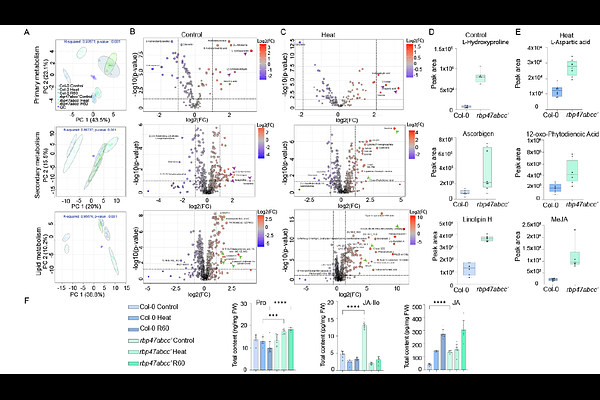RBP47 family members are negative regulators of heat stress tolerance in Arabidopsis thaliana

RBP47 family members are negative regulators of heat stress tolerance in Arabidopsis thaliana
Hernandez-Sanchez, I. E.; Tarbiyyah, I.; Kearly, A.; Martinez-Seidel, F.; Maruri-Lopez, I.; Chen, Y.; S. Rissland, O.; Wang, W.; Sioud, S.; Schwarzenberg, A.; Nelson Dittrich, A. C.; Nelson, A.; Chodasiewicz, M.
AbstractStress granules (SGs) are liquid-liquid phase-separated condensates that sequester RNA, proteins, and metabolites to modulate cellular physiology under stress. In Arabidopsis, the RNA-binding protein RBP47b is a canonical SG marker, yet its functional contribution to thermotolerance remains unresolved. Here, we combined mTurboID proximity labeling with multi-omics profiling to define the RBP47b interactome and its physiological impact. mTurboID identified a stress-specific enrichment of 40S ribosomal subunits within RBP47b SGs, implicating these condensates in translational control. Surprisingly, quadruple mutant plants lacking all four RBP47 paralogues (rbp47abcc\') displayed enhanced survival, attenuated growth delay, and faster recovery of photosynthetic efficiency after severe heat stress. Integrated transcriptome, proteome, and metabolome analyses revealed that this gain of thermotolerance is associated with (i) accelerated re-initiation of translation, (ii) constitutively elevated jasmonate and oxylipin pools, and (iii) reduced ROS accumulation during heat and recovery. We conclude that the RBP47 family acts as a negative regulator of heat tolerance by sequestering 40S subunits and limiting translational restart; loss of these SG scaffolds pre-primes jasmonate-dependent detoxification pathways and expedites proteome rebuilding, thereby conferring superior thermotolerance.